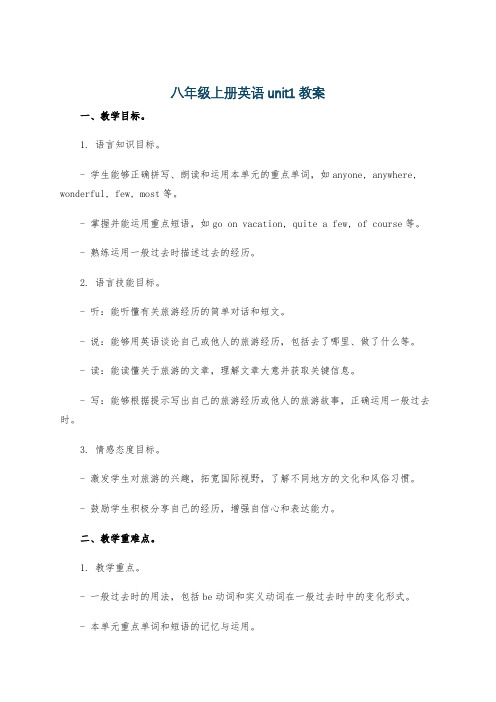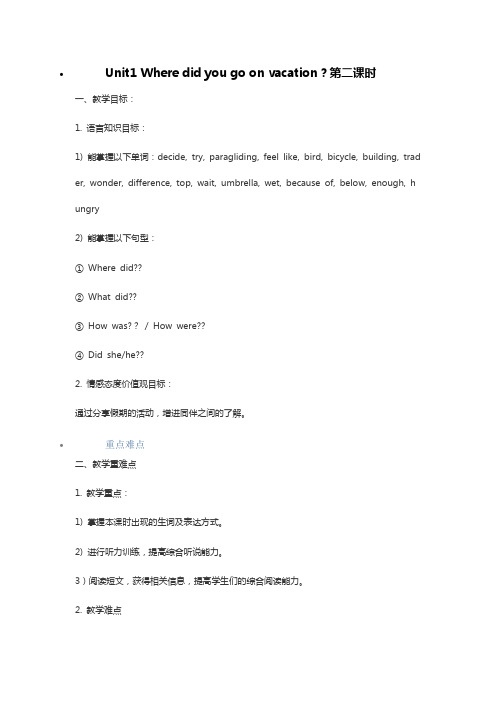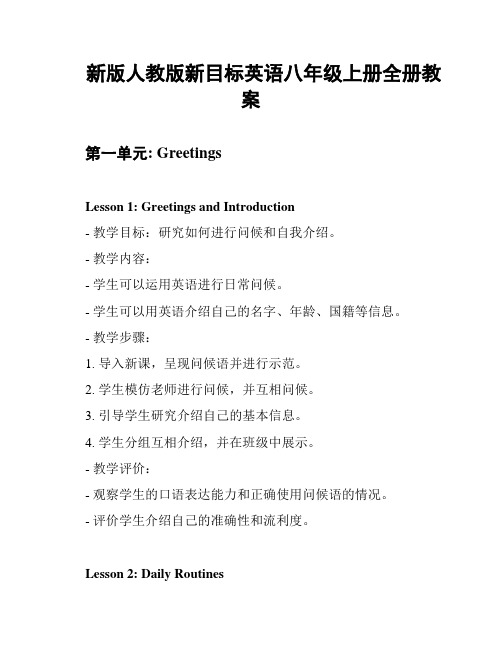八年级上册英语第一单元教案
关于八年级上册英语第一单元教案5篇

关于八年级上册英语第一单元教案5篇关于八年级上册英语第一单元教案5篇教案帮助教师规划教学内容和安排教学进程。
它提供了每节课的时间分配、课堂活动设计等信息,有助于教师合理安排教学时间,优化教学资源的利用,确保教学进度的顺利推进。
下面给大家分享八年级上册英语第一单元教案,欢迎阅读!八年级上册英语第一单元教案精选篇1一、教材分析:本模块以出行旅游为话题,通过大量的语言材料集中展示了问路、指路、对某一区域进行描述的语言表达方式。
本节课是本模块的第一课时,是一节听、说课,主要通过听、说、读、写来展开课堂活动,为学生提供了充足的体验和运用语言的机会。
学情分析:学生在七年级已学过一些方位介词和问路的句子,这为学习本单元新知识奠定了基础。
利用学生对学校周围环境比较熟悉这一特点作为切入点,引导学生深入探究、自主解决问题。
二、教学目标: (Teaching aims)1、Knowledge Objectsa. Key vocabulary ____ bank, market, supermarket, pool, swimming pool,square, structures, left, right, opposite, chairman,between, turn, corner, alongb. Key structures ____ How do I get to…Can you tell me the way to….Go straight ahead.Go along…../Go across….Turn left into….It’s opposite…/on the corner of…/between…and...2.Ability ObjectsTo understand the conversation of giving directionsTo understand the sentences telling positionsTo learn how to give directions3.Moral ObjectsStudents can help the others.三、教学重、难点:学生能熟练运用本节课重点句型四、教材分析:本单元是在通过日常的问候和交谈后,自然引出在五、策略与方法:1.教法(1)直观教学法:借用多媒体展示画面,给学生直观的感觉,创建真实的语言环境,引导学生在情景中学习语言,在学习新的语言知识后,创造地运用语言。
八年级上册英语第一单元教案

八年级上册英语第一单元教案八年级上册英语第一单元教案教学目标:1.能够正确地听、说、读、写本单元的重点词汇和重点句型。
2.能够正确使用一般现在时来表达自己的日常活动。
3.能够听懂、会表达兴趣爱好、日常活动和能力,并与他人进行简单的交流。
4.能够理解文章大意,从中获取信息,并能够写出简单的日记。
教学重点:1.重点词汇及短语:hobby, skill, play the guitar, play chess,go shopping, swim, read books, play basketball等。
2.重点句型:What do you do at the weekend? I often go shopping. Do you like swimming? Yes, I do.教学准备:PPT课件、单词卡片、录音机教学过程:一、导入(5分钟)1. 老师用PPT出示一张张单词卡片,让学生说出单词的汉语意思。
2. 老师以“What’s your hobby?”为题展开小组讨论,让学生介绍自己的爱好,并与他人交流。
二、新课讲解(15分钟)1. 老师用PPT介绍新词汇,并教授它的音标和词性。
2. 老师用PPT出示卡片,学生跟读单词及完成相关练习。
三、听力训练(10分钟)1. 老师播放录音。
2. 学生根据录音内容选择正确答案。
四、口语练习(15分钟)1.学生两人一组,轮流用“What do you do at the weekend?”和“What’s your hobby?”来询问和回答。
2. 扩展练习:老师将学生分群,分别给每组一种媒体——电视、广播、报纸等,并用“What do you often do when you watch TV?”或“When do you often listen to the radio?”等问题来让学生描述他们的活动。
五、写作训练(10分钟)老师带领学生写一篇15-20词的小短文,描述自己的一个好朋友所喜欢的活动。
八年级上册英语unit1教案

八年级上册英语unit1教案一、教学目标。
1. 语言知识目标。
- 学生能够正确拼写、朗读和运用本单元的重点单词,如anyone, anywhere, wonderful, few, most等。
- 掌握并能运用重点短语,如go on vacation, quite a few, of course等。
- 熟练运用一般过去时描述过去的经历。
2. 语言技能目标。
- 听:能听懂有关旅游经历的简单对话和短文。
- 说:能够用英语谈论自己或他人的旅游经历,包括去了哪里、做了什么等。
- 读:能读懂关于旅游的文章,理解文章大意并获取关键信息。
- 写:能够根据提示写出自己的旅游经历或他人的旅游故事,正确运用一般过去时。
3. 情感态度目标。
- 激发学生对旅游的兴趣,拓宽国际视野,了解不同地方的文化和风俗习惯。
- 鼓励学生积极分享自己的经历,增强自信心和表达能力。
二、教学重难点。
1. 教学重点。
- 一般过去时的用法,包括be动词和实义动词在一般过去时中的变化形式。
- 本单元重点单词和短语的记忆与运用。
- 能够运用所学知识描述旅游经历。
2. 教学难点。
- 一般过去时中不规则动词的过去式的记忆与正确使用。
- 如何引导学生在描述旅游经历时,使内容丰富、有条理。
三、教学方法。
1. 情景教学法。
通过创设旅游的情景,让学生仿佛置身于旅游场景中,更直观地学习和运用英语。
2. 任务驱动法。
布置各种任务,如对话练习、短文写作等,让学生在完成任务的过程中提高语言运用能力。
3. 交际教学法。
鼓励学生之间进行英语交流,分享旅游经历,提高口语表达能力。
四、教学过程。
1. 导入(5分钟)- 展示一些著名旅游景点的图片,如长城、埃菲尔铁塔、自由女神像等,然后提问学生:“Have you ever been to these places? Where did you go on vacation last year?”引导学生用简单的英语回答,从而引出本单元的话题——旅游经历。
八年级上英语Unit1教案

•Unit1 Where did you go on vacation?第二课时一、教学目标:1. 语言知识目标:1) 能掌握以下单词:decide, try, paragliding, feel like, bird, bicycle, building, trader, wonder, difference, top, wait, umbrella, wet, because of, below, enough, h ungry2) 能掌握以下句型:①Where did??②What did??③How was??/ How were??④Did she/he??2. 情感态度价值观目标:通过分享假期的活动,增进同伴之间的了解。
•重点难点二、教学重难点1. 教学重点:1) 掌握本课时出现的生词及表达方式。
2) 进行听力训练,提高综合听说能力。
3)阅读短文,获得相关信息,提高学生们的综合阅读能力。
2. 教学难点听力训练•教学方法听力训练技巧,小组合作•课时安排第2课时•课前准备录音机,多媒体,图画•教学过程Ⅰ. Warming- up and revision1. Daily greeting.2. Check the homework. Let some Ss report where did they go on vacation.3. Review the “复合不定代词”4. Review the “反身代词”5. Show a movie of paragliding.Ⅱ. WritingWork on 1a:1. Point to the six words. delicious, expensive, exciting, cheap, terrible, boring2. Read the words and let Ss read after the teacher.3. Point to the last picture and say: This is a cake. It’s delicious. Then do the same thing for all six pictures.4. Let Ss match each word with a picture. Then check the answers with the s tudents. ?Work on 1b:1. Explain the meaning of “? words”and “? words.”2. Let Ss discuss the words they know and write them down on the line.3. Let some Ss read out their words to the class. (Or let some Ss write their words on the blackboards.)Ⅲ. ListeningWork on 1c:1. T: Now let's work on 1c. First, let one student read the questions aloud. M akesure all the Ss know the meanings of the questions.2. Play the recording for the first time. Ss only listen.3. Then play the record ing for the second time. Ss listen and answer the questions.4. Then play the recording for the third time for the Ss to check the answers.5. Ss listen to the tape and circle the words and phrases they hear.6. Check the answers: (Look at the big screen.)Work on 1d:1. Tell Ss this time they have to write down what Lisa said about her vacatio n, the people, the fun park, the food and the store.2. Then play the recording for the second time. Ss listen and write down the words.3. Then play the recording for the third time for the Ss to check the answers.听力指导:在听时要抓重点内容。
新版人教版新目标英语八年级上册全册教案

新版人教版新目标英语八年级上册全册教案第一单元: GreetingsLesson 1: Greetings and Introduction- 教学目标:研究如何进行问候和自我介绍。
- 教学内容:- 学生可以运用英语进行日常问候。
- 学生可以用英语介绍自己的名字、年龄、国籍等信息。
- 教学步骤:1. 导入新课,呈现问候语并进行示范。
2. 学生模仿老师进行问候,并互相问候。
3. 引导学生研究介绍自己的基本信息。
4. 学生分组互相介绍,并在班级中展示。
- 教学评价:- 观察学生的口语表达能力和正确使用问候语的情况。
- 评价学生介绍自己的准确性和流利度。
Lesson 2: Daily Routines- 教学目标:研究描述日常活动。
- 教学内容:- 学生能够运用英语描述自己的日常活动。
- 学生可以用英语叙述一天的活动安排。
- 教学步骤:1. 复前一课的内容,引导学生回忆日常活动的英语表达。
2. 引导学生研究新的日常活动的词汇和句型。
3. 学生分组分享自己的一天活动安排,并向全班汇报。
- 教学评价:- 观察学生对日常活动词汇和句型的掌握程度。
- 评价学生的口语表达和沟通能力。
第二单元: Hobbies and Leisure ActivitiesLesson 1: Hobbies- 教学目标:研究谈论自己的兴趣爱好。
- 教学内容:- 学生可以用英语描述自己的兴趣爱好。
- 学生可以运用所学词汇进行对话练。
- 教学步骤:1. 复前一课的词汇和句型。
2. 引导学生研究新的兴趣爱好词汇。
3. 学生分组进行对话练,谈论自己的兴趣爱好。
- 教学评价:- 观察学生对兴趣爱好词汇的掌握情况。
- 评价学生在对话练中的口语表达能力。
Lesson 2: Leisure Activities- 教学目标:研究谈论闲暇活动。
- 教学内容:- 学生能够用英语描述自己的闲暇活动。
- 学生能够与他人交流关于闲暇活动的话题。
- 教学步骤:1. 复前一课的词汇和句型。
外语教学与研究出版社初中英语八年级上册全册教学设计教案

外语教学与研究出版社初中英语八年级上册全册教学设计教案教学设计目标- 帮助学生掌握八年级上册英语的基本语法知识和词汇量- 提升学生听、说、读、写的能力- 培养学生的英语交流和表达能力- 激发学生对英语研究的兴趣和自主研究的能力教学内容安排第一单元:Meeting New Friends- 语言知识:- 重点词汇:greeting, introduce, name, age, hobby, country, etc. - 语法重点:be动词的使用和一般现在时的基本句型- 听力:听取对话并选择正确的答案- 口语:运用所学词汇和句型进行自我介绍和询问他人信息- 阅读:阅读短文并回答相关问题- 写作:写一篇关于自我介绍的短文第二单元:School Life- 语言知识:- 重点词汇:classroom, teacher, subject, homework, test, etc. - 语法重点:there be句型和物主代词的使用- 听力:听取学校活动并选择正确的回答- 口语:描述学校的不同场所和活动- 阅读:阅读有关学校生活的短文并回答相关问题- 写作:写一篇关于学校活动的日记第三单元:Hobbies and Interests- 语言知识:- 重点词汇:hobby, interest, music, sport, game, etc.- 语法重点:动词的ing形式和频度副词的使用- 听力:听取关于不同爱好和兴趣的对话并回答相关问题- 口语:谈论自己和他人的爱好和兴趣- 阅读:阅读有关兴趣爱好的文章并回答相关问题- 写作:写一篇关于自己的兴趣爱好的短文第四单元:Family and Relationships- 语言知识:- 重点词汇:family, father, mother, brother, sister, friend, etc.- 语法重点:所有格的使用和形容词的比较级- 听力:听取有关家庭和关系的对话并回答相关问题- 口语:描述自己的家人和朋友,并表达关系- 阅读:阅读有关家庭和友谊的短文并回答相关问题- 写作:写一篇关于自己家庭和朋友的介绍教学方法- 多媒体教学:利用图片、音频和视频等多媒体资源,激发学生的研究兴趣- 互动式教学:通过小组讨论、合作活动和角色扮演等形式,提升学生的参与度和表达能力- 循序渐进教学:根据学生的实际水平和能力,逐步引导学生研究新的语法知识和词汇量- 多样化评估:通过口语演示、书面作业和小测验等方式,全面评估学生的研究成果教学资源- 《外语教学与研究出版社初中英语八年级上册全册教材》- 多媒体设备和教学软件- 翻译工具和在线词典- 练册和作业本以上是本教学设计教案的内容安排和方法介绍。
人教版八年级英语上册Unit1 教案

人教版八年级英语上册Unit1 教案人教版八年级英语上册Unit1 教案【教案一】Section A(1a - 1c)◆学习目标1.重点短语: stay at home,go to the mountains,go to summer camp2.重点句式:—Where did Tina go on vacation ?—She went to the mountains.◆学习重点1.重点短语和句型2.一般过去时态的特殊疑问句和陈述句◆学习难点一般过去时态的特殊疑问句和陈述句◆自主学习一、认真预习1a—1c,找出下列短语和句型。
1.待在家里 ____________________2.去山区 ____________________3.去夏令营 ____________________4.去纽约城 ____________________5.—蒂娜去哪里度假了?___________________________________________________________ _____—她去山区了。
___________________________________________________________ _____________◆课堂导学Step 1情景导入Teacher:Hello,everyone.Glad to see you again.Did you have a good time during the vacation? Did you go anywhere interesting with your parents? Did you do anything special there? Can you tell us where you went on vacation ?环节说明:以学生假期旅行为话题开始本节课的教学,引起了学生的学习兴趣和用英语表达的欲望。
八年级上册英语unit1教案(共5课时)

Unit 1 How often do you do exerciseTeaching aims of this unit:Language goals :1.Vocabulary: always usually often sometimes hardly ever never ,once a day ,twice a week ,three times a month, my eating habits ,healthy /unhealthy lifestyle , keep in good health, junk food ,eat less meat, the same as, be different from ,the difference between…and…, of course ,look after, be good /bad for, sleep nine hours every night all /most /some /no students ,maybe, although exercise =do/play sports2.Ask and answer : What do you usually do on weekends?I often watch TV on weekends.How often do you watch TV?I watch TV twice a week..How long do you sleep every night?I sleep nine hours every night.What are the differences?3. Topic :My lifestyle or habitsAims of abilities:Talk about how often you do thingsAims of emotion: Get the messages from the others successfully.nguage functions: Wh-questions, What do …?, How o ften …?,Adverbs of frequency, All/most/some/none课时安排5课时Period One: Section A (1a—2c)Period Two: Section A (3—4)Period Three: Section B (1a—2c)Period Four:Section B (3a—4)Period Five: Self check and Revision (A-self check)Period OneTeaching Aims:1. Learn to talk about how often do you do things2. To learn the words of the adverbs of frequency.Teaching Difficulties:1.words: exercise, skateboard, hardly, ever, shop, once, twice, time, surf, internet, program.2.phrases:how often, on weekends, go to the movies, exercise, go skateboarding,always , usually , often , never , hardly ever , sometimes .3.Sentence patterns: What does she /he do on weekends ? She often goes to the movies .How often do you shop ? Once a week / Twice a week ··· .Teaching Aids: Tape recorder; Multi-Media.Teaching Procedures:Step 1 :Greeting.1.Welcome back: Talk about their holidays.2.Encourage Ss to share their holidays with the whole class.Step 2 :Leading – in1. Do you like watching TV? Yes ,I do.Do you watch TV every day? Yes, I do.How often do you watch TV?I watch TV every day. I watch TV twice a week.2.Introduce the key vocabulary.Ask the students to say what they see in the thought bubbles.Check the answers on the board.2.3. Name each activity.Repeat reading the following: watch TV, read, shop, go skateboarding, exercise, draw4. Look at each picture in 1c.Tell what the person does on weekends.Check the Ss orally.1) Make sure what they will hear and do .2) Read these adverbs and explain.5.Play the tape twice .Write the letters on the line.Ask Ss: Well, do you still remember your last vacation?How did you spend it?Was it the same as this summer vacation?So what do you often do in your summer vacation?Then show some phrases for Ss to practice.Then present as following:always>usually>often>sometimes>hardly ever(几乎没有) >neverand let them understand their differences at the first time.Step 3 :Guessing Presentation and Practice.always, usually, often, sometimes, hardly ever(几乎没有) or never.And during this part, present surf the net exercise and go skateboarding.How often does he take a shower?Let Ss ask and answer in pairs, using always, usually, often, sometimes, hardly ever(几乎没有) or never.Step 5: Homework1.Do exercises on pages 1-2 of the workbook to practice the language presented in this unit.课后记:Period TwoTeaching Aims:1. Students can learn to talk about activities and how often to each other2. Students can listen, talk ,read and write these words correctlyTeaching Difficulties:1. Words: high school, most, no, result, active, for as, for about2. Phrases: for as, for about3.Sentence patterns: How often do you shop? I shop once a month.How often does Cheng watch TV? He watches TV..Teaching Aids: Tape recorder; Multi-Media.Teaching Procedures:Step One :Greeting.Step Two :Leading – inDrills:T: What do you usually do on weekends ?S1: I usually play soccer .T: How often do you play soccer ?S1: I play soccer twice a week .T: How often does he play soccer ?The other Ss: He plays soccer twice a week .Repeat for three times .Step Three :Pre-taskReview the grammar box .Step Four :While-task1. Call attention to the survey .2.Make sure the Ss understand the chart .T: What activity do ninety-five percent of Green High students do every day ?3. Ss answer .If necessary , give them help .4. Review the information in the green box with Ss .5. Read the article first by the Ss .6. Check the answers .7. Practise reading .Step Five :Post-task1.T: What can you do to improve your English ?(e.g. read English books, practice reading and speaking ) How often do you ··· ?2.Think of more things you can do to improve your English and write them here .3.Ask several Ss each question .4.See: Who is the best English students in the classStep Six: Homework:1.Revise the new words .课后记:Period ThreeTeaching Aims:Learn to talk about how often they do things to keep healthy.Teaching Difficulties:1.Words:junk food, milk, coffee, chips, cola, chocolate, drink, health, how many, interviewer.2.Phrases: how many, be good for, be bad for, every day.3.Sentence patterns: How often do you drink milk, Liu Feng?How many hours do you sleep every night?She says it’s good for my health.Teaching Aids: Tape recorder; Multi-Media.Teaching Procedures:Step 1 :Greeting.Step 2 :Warm-up1.Enjoy an English song.2.Free talk. Talk with Ss about the following questions:Do you like fruit vegetables?Yes, I do.I love it/ them. It’s/They’re delicious. And it’s /they’re healthy food. It’s/They’re good for our health. Or No, I don’t. It’s awful. I can’t stand it.Ask Ss: How often do you eat fruit vegetables?Step 3: Presentation1.Teach milk. Do you like milk? Do you drink milk every day? Why /Why not?2.Then teach chip /cola/chocolate/coffee in the same way. Don’t fo rget to ask them Are they/Is ith ealthy food /drink? They’re /It’s healthy/unhealthy/ junk food.Don’t eat /drink them /it too often. Step 4: Pair workSs make a similar conversation by themselves.A: How often do you{ eat…?drink…?B : I eat/drink… every day/….A: Do you like it ?B: Yes, I do. It’s g ood for my health./No, I don’t. But my mother wants me to eat/drink it.Step5 : PresentationThe teacher asks Ss other questions:How often do you exercise/watch TV/read English/play computer games?How many hours do you exercise/watch TV/read English/sleep/play computer games?Step 6: Pair workGet Ss to make a long conversation by themselves.Step 7: Listen (work on 2a)Get the Ss to listen and circle the answers to each question .Later check the answers.Step 8: Work on 2bListen again and fill in the blanks in the survey. Then check the answers.Step 9 .Group workRole play. Student A is the interview. Student B is Katrina. Student C is Bill. Try to act the conversation out .They can use their own words.Step 10.Task Get the Ss to ask their classmates as many questions as they can about their lives. The questions above (2b) can help them. After that they can give a report in front of the class.Step 11. Homework :1. Finish the exercise in this period.2. Write the report in the exercise book.课后记:Period Four:Teaching Aims:1. Learn following expressions:2. Learn to write one’s own habits.Teaching Difficulties:1.Words:habit, try, lifestyle, grade, better, same, as, different, difference, maybe, although, for, keep, must.2.Phrases: eating habits, look after, healthy lifestyle, unhealthy lifestyle, good grades.3. Main task: How to write a composition of one’s habits.Teaching Aids: Tape recorder; Multi-Media.Teaching Procedures:Step1: Revision1. Free talk:2.Ask and answerHow often do you exercise? How often do you eat vegetables/fruit/junk food?How often do you drink milk/coffee/tea? How many hours do you sleep every day?Use he/she/they ask and answer these questions.Group worksStep 2.Presentation and Practice1.Free talk.What is a healthy lifestyle.After that, T can show a picture with healthy lifestyle and unhealthy one:eat fruit never eat vegetables/fruitvegetables drink coffee/wine too muchdrink milk never drink milksleep 9 hours sleep 5 hoursdo exercise never do exercisehealthy lifestyle unhealthy lifestyleT: And you know: Healthy lifestyle can help us get good grades. Good food and exercise help us to study better. My student Katrina has a good lifestyle. Let’s see it.Step 3.Read 3a.Compare the passage with yourselves.Explain:of course , pretty healthy/good ,unhealthy ,a healthy lifestyle, try to do sth..,look after, help sb. to do sth., study better, the same as, be different fromGive more examples.Step 4. Finish 3b.Sep 5.Homework:课后记:Period Five: Self check and Revision Step1 Greetings & free talk .Step2DiscussionWork in groups, discuss which kind of life is healthy.Do a report according the discussion.We think we should eat fruit and vegetables…Step3 Self checkFill in each blank with the correct word given.Then make your own sentence with each word.1. wants2.exercises3.help4.try5.haveStep3 Key vocabulary1.ever adv. 曾经2. once adv. 一次3. twice adv. 两次4.internet n.互联网5. program n. 节目单,(电脑)程序6. hilltop n. 山顶7. result n. 结果,成果8. key n. 提醒,提示,线索,答案9. translate v. 翻译10. song n. 歌曲11.junk n. 垃圾,破烂物,废弃的旧物12. milk n. 牛奶13. interviewer n. 采访者14.habit n.习惯,习性15.difference n. 不同,差异,区别16.grade n. 分数,成绩,年级17. although conj. 虽然,即使,纵然18. unhealthy adj.不健康的,不益健康的19.skateboarding n. 溜滑板运动Step4 Key phrases:1. how often 多久一次2. as for至于,关于3. junk food垃圾食品4.eating habit 饮食习惯5.of course当然6.look after 照顾,照看7. start with 以……开始8. make a difference使得结果不同,有重要性9. go shopping去购物10.have a party 聚会11. go to the movie去看电影12. once a week每周一次13. hardly ever很少14. twice a week每周两次15. three times a week每周三次16. watch TV看电视17.on weekend在周末18. do homework做作业19. a lot of许多20. try to do试图(努力)做某事21. help sb (to) do sth.帮助某人做某事22. the same as和……相同23.keep in good health保持身体健康Step 5 Grammar1.掌握句型:1)What do you usually do on weekends? I often go to the movies.What does she do on weekends ?She often goes to the movies.What do you usually do on weekends? I often go to the movies.(watch TV、read books 、exercise 、clean、skateboard、play basketball、wash clothes、go shopping、go to movies)How often do you exercise/… ?Task one “Find my group members.”2)在规定时间内填完活动表格,再向周围同学开始询问,找出与自己课外活动大致相同的同(1)教师指着屏幕说:“ Now let’s see my activities on weekends. How often…?屏幕上出现各项活动的图片并介绍。
- 1、下载文档前请自行甄别文档内容的完整性,平台不提供额外的编辑、内容补充、找答案等附加服务。
- 2、"仅部分预览"的文档,不可在线预览部分如存在完整性等问题,可反馈申请退款(可完整预览的文档不适用该条件!)。
- 3、如文档侵犯您的权益,请联系客服反馈,我们会尽快为您处理(人工客服工作时间:9:00-18:30)。
八年级上册英语第一单元教案八年级上册英语第一单元教案精选篇1课题 Unit VII 授课班级 Class Grade VII课型 REVISION 教师学习内容 Unit VII学习目标知识与技能:1. 识别和掌握购物相关用语、部分服务用语。
2. 学会英语中有关服装名称等等。
过程与方法:通过听、读、说、写等活动培养良好的学习能力;通过复习,学会正确读写相关知识与技能。
情感态度与价值观:通过复习进一步使学生更还好地掌握英语学习方法。
重点难点重点1. Can I help you?Yes,please.What can I do for you ?I need a T-shirt.What color do you want? I want a yellow one.How much is it?It’s thirty dollars.How much are these apples? They are ten yuan.What’s the price of this jacket? It’s 45 dollars.难点:真实购物交际运用的掌握。
学具准备学案,习题学习形式教师导学,学生学习学习过程一、提出复习要求。
二、宣布复习内容本课时我们将归纳复习Unit VII内容。
词汇与短语:clothes socks T-shirt shorts sweater trousers shoes skirt big small short long woman women man men need take store buy sale price how much a pair of have a look (at) clothes store the price of dollar ten 十 eleven 十一 twelve 十二thirteen 十三fourteen 十四fifteen 十五sixteen 十六seventeen 十七 eighteen 十八 nineteen 十九twenty 二十 thirty 三十 forty 四十 fifty 五十sixty 六十 seventy 七十 eighty 八十 ninety 九十基本句型:Can I help you?Yes,please.What can I do for you ?I need a T-shirt.What color do you want? I want a yellow one.How much is it?It’s thirty dollars.How much are these apples? They are ten yuan.What’s the price of this jacket? It’s 45 dollars.三、练习与检测《同步轻松练习》(omitted)四、2e on page 38五、写作训练Example: Mr Cools Clothes StoreCome and buy your clothes at our great sale!We sell all our clothes at very good prices.Do you like sweaters?We have green sweaters for only $15! Yellow sweaters are only $12!Do you need trousers?For boys,we have black trousers for only $22.And shorts are only$16!For girls,we have skirts in purple for only $28.Socks are only$2 for three pairs!Come to Mr.cools Clothes Store now!Mr Cools Clothes SaleCome to Mr Cools Clothes Store!We sell pants for only ¥30.Do you like sweaters?We have sweaters at a very good price‐only ¥20!We sell socks for only ¥3 each!For boys,we have T‐shirts in white and yellow for only ¥15.For girls,we have hats for only ¥12!We sell shorts for only ¥18 each. Come and see for yourself at Mr Cool Clothes store!彼得的服装店(Peters Clothes Store)开张了,请用下列词语帮彼得写一则广告,至少写六句。
参考词汇:come to,T–shirt($5 in all colors,),sweater($17,red andwhite),shoes($12,green)自主复习下一单元内容,完成相关训练题八年级上册英语第一单元教案精选篇2一、教学目标:1、目标语言重点词汇:1,want somebody to do 2. be good for 3.pretty healthy 4.my eating habit 4.try to do 5.two or three times a week 6. help somebody to do 7.look after my health 8.get good grades 9.study better 10.the same as 11. kind of unhealthy重点句型:-含有以上词组的11句子。
综合能力:能阅读介绍饮食习惯方面的*2、情感渗透学会养成良好的生活习惯和饮食习惯,从而合理安排自己的各项工作,享受丰富多彩的校园生活。
二、教学准备:教师准备:1,设计课后巩固练习的幻灯片,2,部分有关事务的幻灯片3,录音机和磁带。
学生准备收集自己和他人生活习惯的信息:查找更多食物的英语名称。
预习导航::1、听单词录音,熟记Section A的新单词,并制作单图片。
2、完成1a,列出图中物品的英语单词,并识记新单词。
3、读1a、1c中的对话,区别My name’s Jenny.和I’m Jenny.4、找出并区别I you my your his her。
三、教学过程:1. 预习导学或自测1) 很少/几乎不曾_______________2) surf the lnternet _______________3) 大部分学生__________________4) as for ________________________5) 一周两次_______________________6) be good for ________________________7) 照顾___________________________8) eating habits ______________________9) 六到八次_______________________10) try to do sth ___________________Step1. Revision.Ask and answer in pairs like this.What do you do on weekends/I often exercise How often do you exercise ?.I exercise five times a week.(设计说明)先有老师示范对话,询问学生周末日常活动,然后两人一组自由对话,利用图片进行。
为新课学习作好铺垫。
Step2.Leading in.1,要求学生将单词和字母对应,完成1a任务,2,引导学生进行1B的pair work 活动,自编对话完成1b中的学习内容。
(设计说明)这里可巩固练习词组,want somebody to do.与 be good for并造句子。
Step3:3.播放录音,要求学生完成2a的听力内容。
4.再播放录音,要求学生完成2b的听力内容,并将此词填在合适的位置。
(设计说明)通过听力训练,使学生学会听关键词和推测词意的能力,并理解目标语言。
5.引导学生进行2c的Pair work活动,自编对话,完成2c中的学习内容。
6.引导学生阅读3a的短文,要求学生回答设计的问题,完成3a的内容引导学。
合作探究课文解析. 3a1) pretty表示“十分”作副词用,我们以前学过quite和very也有这种意思。
其中它们的程度由浅入深为quite→pretty→very.相当健康:2)I exercise every day, usually when I come home fromSchool.我每天锻炼身体,3) eating habits:4) try to do sth意为eg:他尽力通过考试:5) Of course.:6) So you see, I look after my health. 所以你看,我很在意我的健康。
look after 意为eg:Can you when I leave?能帮我照顾一下孩子吗?look还可以和许多词搭配,但意思不一样。
(1)look ateg:Please look at the blackboard.(2)look foreg:我在找我的笔(3)look likeeg::你爸爸长什么样?4) Good food and exercise好的饮食和锻炼帮助我学得更好。
5)帮助某人做某事6) be good for7)be good at =do well in8)be good to sb.9) 和…相同与……不同不同: (n.)differenceeg.There are many (不同点)between the two pictures.10) although虽然,尽管,引导让步状语从句,与同义,但不能与同时出现在一个复合句中,可与still, yet同用。
11) 保持健康: = be in good health =keep/ be healthy4.拓展创新注意sometimes与几个形似的词的区别。
A. sometime是副词,意为“在某个时候”,“某时”B. sometimes:有时候是副词。
C. some time是名词词组,意为“一段时间”,做时间状语用D.some times是名词词组,意为“几次,几倍”。
